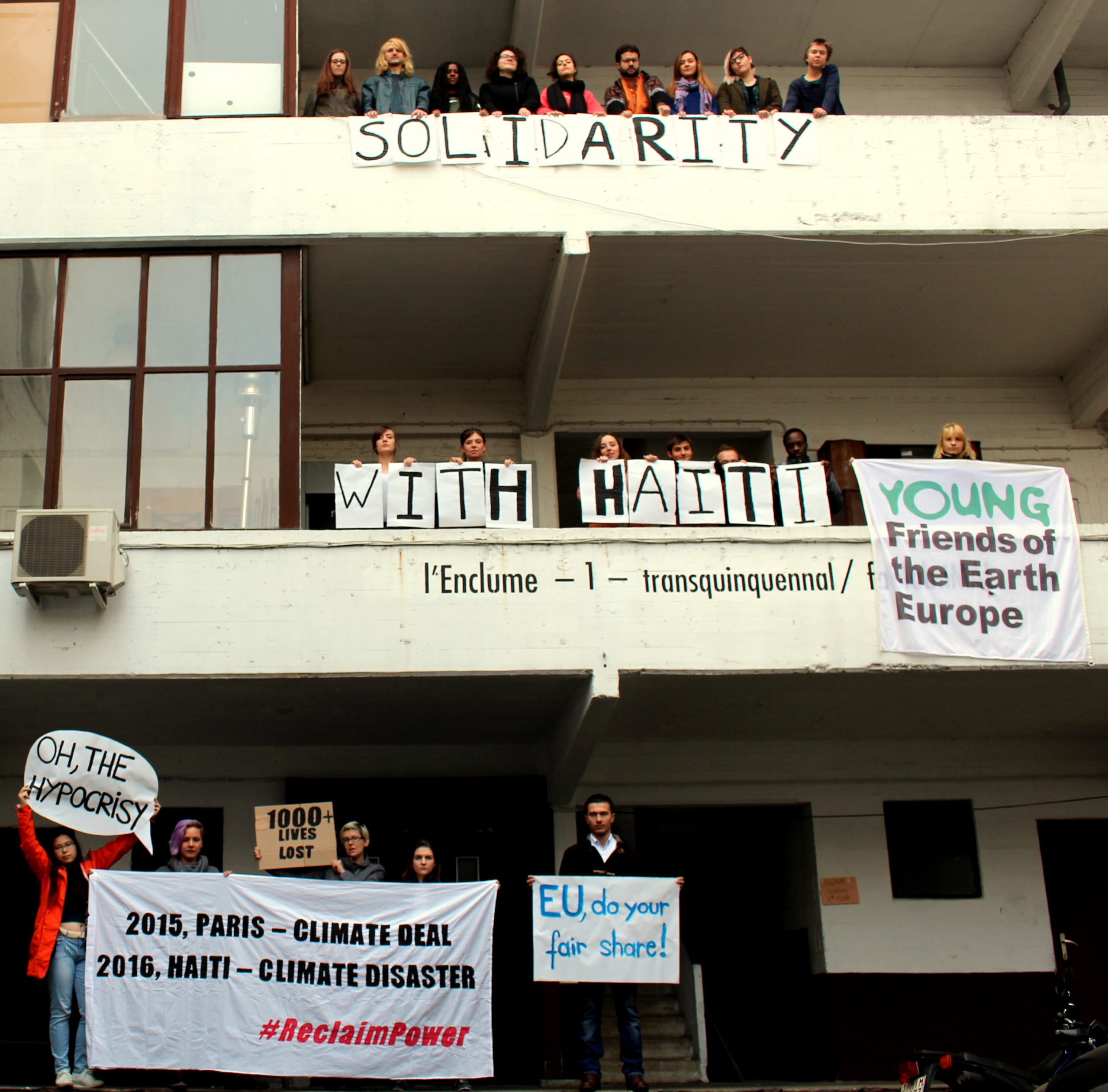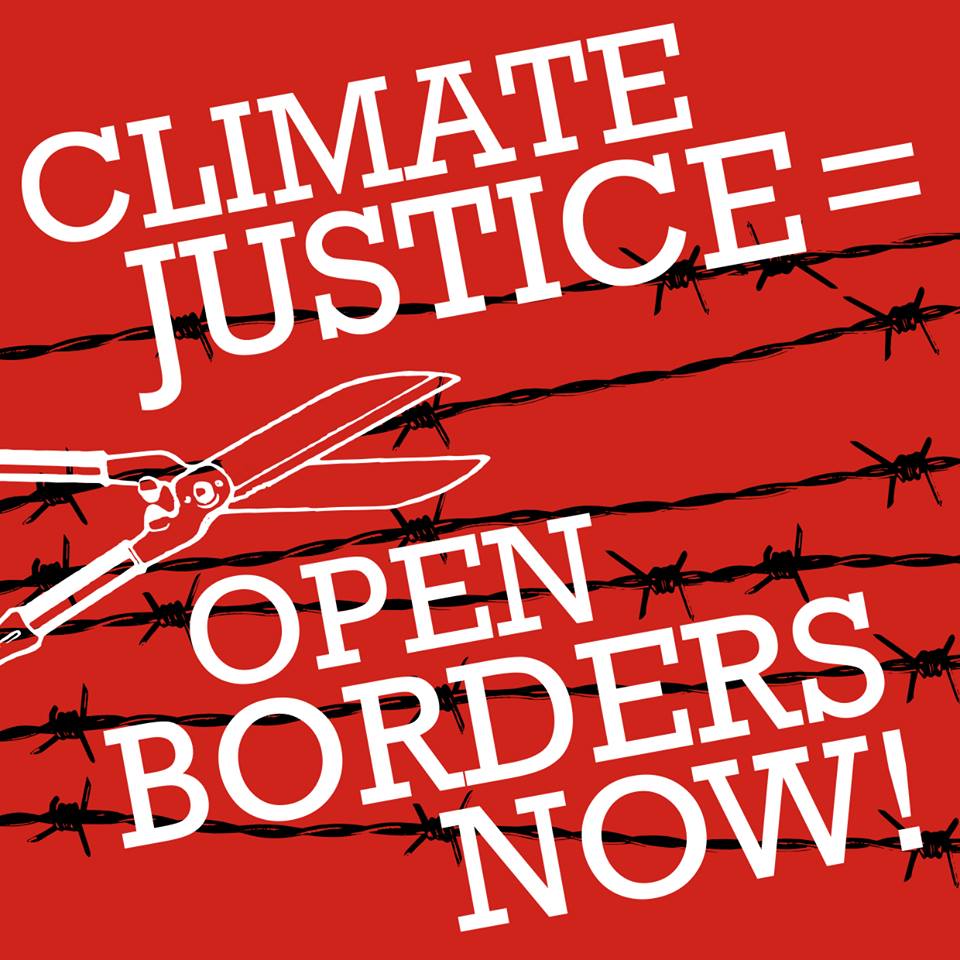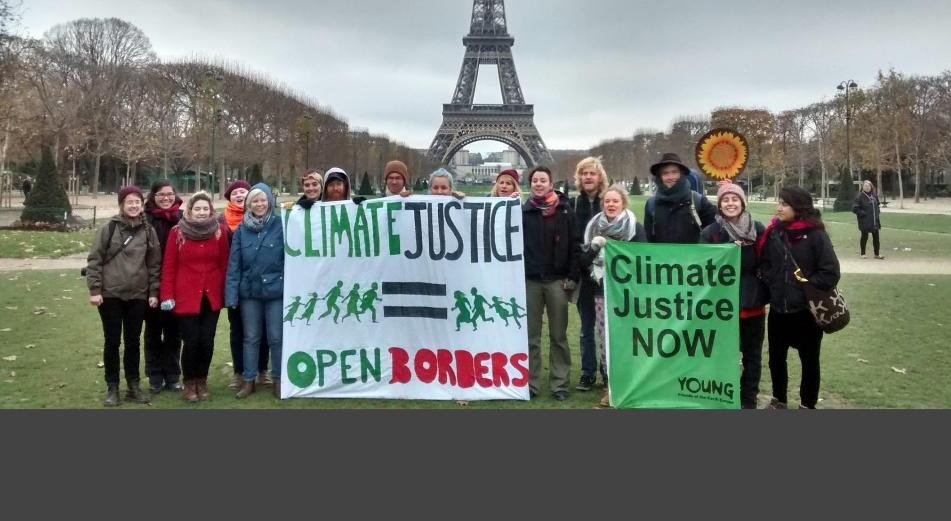A comprehensive article compiled by members of the Young FoEE Climate Justice working group to mark the start of the UN Climate Talks in Marrakech – outlining our views on the need for ambitious action on climate change to avoid causing further instability and injustice.
COP 22: What will climate justice mean in Marrakech?
Today opens the 22nd session of the UN climate change conferences, the COP 22. The Paris Agreement was signed last year, and while the Kyoto Protocol took close to ten years to enter into force, this text took less than a year to do so. Many hail this as a grand victory and a sign that things are on the move. However, as we pointed out in 2015, the point of these conferences should be reaching an adequate agreement, not just an agreement itself — and we know the treaty is nowhere near ambitious enough. National commitments are not binding, and they lead us to at least a 3.4°C warmer world. Last week, the UNEP published a report on such a scenario, and the picture has been described as an “apocalyptic scenario”. The UNEP hopes this report will serve as a wake-up call, however the alarm has been ringing for decades. We are currently at +1°C above pre-industrial levels and are witnessing extreme weather events, rising sea levels and the destruction of ecosystems.
Pushing back deadlines for action is characteristic of the UNFCCC process since its origin, and there is no reason to believe that will change. We needed ambitious and just action yesterday, with countries taking responsibility in accordance with their historical responsibility and capacity, as outlined by the precise transition objectives outlined in the Fair Shares report. In this context, the EU must lead the way.
For now, the COP 22 has received little media attention, as it seems everything has been tied neatly in Paris. Nevertheless, stakes are high as the conference will be instrumental in breaking down the often vague rhetoric of the COP21, on finance in particular.

Just recently, a devastating hurricane left over a thousand people dead in Haiti and more than a million in need of humanitarian help. (photo credit: Young FoEE)
Climate justice in Morocco
Morocco — like the African continent — is particularly vulnerable to climate change, with increasing heat waves, droughts, flash floods, sea-water infiltration, and desertification. Sea-level rise is another major challenge as many major cities are located along the coast. Decreasing rainfall and increasing temperatures threaten many crops.Studies show the country is set to face significant impacts from a 2°C temperature rise, and during this year’s summer, 175,000 people lost their jobs due to the impact of drought in Morocco.
Morocco imports 96% of its energy, which explains in part why the country has one of the most ambitious renewable objectives in the world, aiming to reach 42% of renewables in its energy mix by 2020. However, many renewable development projects come with many issues of their own. The well-known mega solar power plant in Ouarzazate, hailed as an example of climate ambition, has in reality a poor environmental record and has been deemed a neo-colonial project for its “green-grabbing” practices. According to Hamza Hamouchene, its effects are “no different to the destructive mining activities taking place in southern Morocco”.
For Hamouchene, “[c]limate change will cause the next revolutions in North Africa”. In the region, populations are already resisting the impacts and practices of extractive industries, confronting companies that attempt to frack the Sahara in Algeria, oil spills in Tunisia, or mining companies that degrade working conditions in Morocco. The country has been rocked by demonstrations since the death of Mohsin Fikri, a fisherman from El Hoceima. That such demonstrations would take place in the week before the COP 22 is telling. Apparently, the two events have no relation. However a closer look at the context shows this is indeed linked to an environmental issue: fishing agreements with the EU signed in 2014 allow huge European ships to empty Morocco’s coast of fish, threatening local fishermen’s means of subsistence. This phenomenon is not limited to Morocco, indeed it is relevant to the whole African continent: the pillaging of resources by the Global North is very much alive.
People in Tangiers, a city in Northern Morocco, also fought back during the candle revolution, when Amendis, a private energy supplier, suddenly increased water and energy prices. In Imider, a Moroccan village in the Sahara Desert, residents have been fighting since 2011 with probably the longest running protest camp in Moroccan history. They are protesting about an industrial well draining water for a silver mine owned by the company Managem, a COP 22 sponsor. The hashtag #300kmSouth used on social media to talk about this struggle refers to the distance of the camp from the COP venue. Another COP22 sponsor is Nareva, an energy company. Owned by the King’s holding company SNI, Nareva is currently building a disputed coal-fired power plant in the city of Safi.
Video on the community’s long fight in Imider and how COP 22 relates to it.
Facing protests during the Arab Spring in 2011, Morocco’s government introduced “liberalising” reforms. The reforms have since been denounced as “hollow” by many activists: journalists are still being jailed for being too vocal on environmental and corporate abuse. As the government unblocked VoIP communication channels for the benefit of international visitors during the COP 22, Moroccans fear this will end after the conference. If so, that would send a strong message indeed, underlining the impression that COPs constitute instruments for governments to clean and promote their image, rather than platforms for meaningful change.
Human rights abuses remain rife. Morocco, a key EU partner in the fortification of European borders, has a record of major migrant rights violations. The country is also involved in the Saudi-led military intervention in Yemen, an intervention questioned over its legality and atrocities.
Another blatant human rights issue is the occupation of Western Sahara. In 1975, as Spain withdrew from the territory, the International Court of Justice ruled the Saharawi people had a right to self-determination. However, the Moroccan state annexed the territory and with the encouragement of King Hassan II, hundreds of thousands of Moroccans marched into Western Sahara. This Sunday the 6th of November marked the anniversary of that event (known as the Green March), a proud day in the image of the Moroccan state, a tragic day for many defenders of the Saharawi. [**See footnote for more info.]
This conflict is directly related to Morocco’s climate ambitions; a significant portion of the country’s plans for renewable energy are set to develop on Western Saharan land. Jalihenna Mohamed, from the Saharawi Campaign Against the Plunder,called on “all attendees of the COP 22 climate talks* to be careful when referring to the Moroccan projects – as many of them are not in fact located in Morocco, but rather contributing to the conflict in neighbouring Western Sahara, which is under annexation.”
Closed borders in the face of climate change
Morocco is also, a key EU partner in the fortification of European borders and has a record of major migrant rights violations.
This year, MSF (Médecins Sans Frontières) has rescued 18,000 people in the Mediterranean. More than 4,200 people have perished attempting the dangerous crossing to seek refuge in Europe. Morocco also constitutes a passage to Europe through the strait of Gibraltar and the enclaves of Ceuta and Melilla. On October 31st, approximately 220 people pushed their way through a barbed-wire fence to reach Spain. Many travel from Sub-Saharan Africa, covering thousands of kilometers, to make the dangerous crossing across land or sea.

Credit: Young FoEE
People who do reach Europe are met with indifferent administrations, xenophobia, and detention centers. While the European Union (EU) celebrates its “climate leadership”, it is simultaneously pumping hundreds of millions of Euros into Frontex, to close its borders and patrol coasts. The agency is looking more and more like an army, while the EU is making deals with Turkey, Afghanistan and North African states to keep people from reaching or staying in Europe. Some European countries continue tofinance wars, and are profiting from the current humanitarian crisis.
We know climate change and displacement are linked. From 2008 to 2014, an average of 26.4 million people were (mostly internally) displaced each year by floods, storms, earthquakes and other natural disasters, according to areport released in July 2015 by theInternal Displacement Monitoring Center. The same report also says that by 2020, some 60 million people could move from the desertified areas of sub-Saharan Africa toward North Africa and Europe; by 2050, about 200 million people may be permanently displaced.
As this humanitarian crisis makes headline news daily, we at Young Friends of the Earth Europe believe it has never been more necessary to underline the links between migrant justice and climate justice. These struggles are inextricably linked, and share root causes – a system that enables some states to develop and become rich at the expense of others. It is no coincidence these are the countries millions of people are now fleeing from. These are the communities that have already been experiencing injustice like war, political persecution, etc. and are now also being faced with climate change impacts. Migration can also be seen as an adaptation strategy for many people who must leave their homes permanently because of many interlinking factors. The EU has historical, political and moral responsibility to open borders and protect people due to its colonial history and present neo-colonial practices.
The Paris Agreement mentions displacement related to climate change, but very briefly and without addressing non-existent international protection. It is our role as a climate justice movement to stress that inaction on climate change will inevitably cause further instability and injustice. This is the message we will carry during COP 22 and beyond.
Climate justice means open borders!
______
Footnote
* At time of writing this article: regarding the Western Sahara occupation – the African Parliament vice-president (from Western Sahara) is currently being denied entry to Morocco for COP22. She’s being held right now – MORE information here.
** Soon after the Green March, a war of independence erupted, ending in 1991 after a UN-brokered ceasefire which included the promise of a future referendum on sovereignty. But 25 years on, no referendum is in sight, and tensions have escalated. Western Sahara today is recognized by the UN as “non-self-governing territory”, and is essentially a police state; Freedom House ranks it as one of the dozen least free “countries” in the world. Defenders of the Saharawi right to self-determination face pervasive repression, and brutality at the hands of authorities. Earlier this year, Saharawi trade unionist and political prisoner Saika Brahim died in custody, his body buried without an autopsy. MORE: Saika Brahim, link.
Further reading
- Must read, by Hamza Hamouchène: Fighting for climate/environmental justice in the Maghreb
- The politics of hosting – by Daniel Voskoboynik
- Reclaim Power statement
- FoE England, Wales and Northern Ireland’s technical analysis of the Paris Agreement
- Media background note on COP 22 from ‘Climate Justice Info’
- Follow COP 22 updates from Third World Network
- Kick Big Polluters Out of UNFCCC – Corporate Accountability International
- Migration and climate change
- COP 22 and climate displacement
- The world at 1°C – October 2016
- FoEI website: Resources & COP 22 news
Important events during COP 22:
- “Marrakech in Berlin” mobilisation from 17th to 20th November (organised by BUNDJugend/YFoE Germany)!
- November 7-8: Imider Alternative COP including Environmental Justice Film Festival (6 hour drive from Marrakech)
- November 9: Africa Renewable Energy Initiative (AREI) event: “Setting the Stage” (12.00 – 13.30 / The Africa Pavilion @ COP venue)
- November 9: Actionaid, Heinrich Boell side event on 1.5 and false solutions (15:00 – 16:30 / Bering – Blue Zone area E @ COP venue)
- November 9: Transnational Institute, Friends of the Siberian Forests, Global Forest Coalition side event on land use and corporations vs communities (15:00 – 16:30 / Arabian – Blue Zone area E @ COP venue)
- November 9: Press conference – Asia Pacific Movement on Debt and Development (APMDD) (15:30 – 16:00 / Press conference room – Blue Zone area G @ COP venue)
- November 10: Friends of the Earth International side event on climate displacement along with CAN South Asia, APMDD, Bangladesh, Norwegian Refugee Council, etc. (16:45-18:15 / Bering – Blue Zone area E @ COP venue)
- November 11: International Trade Union Confederation (ITUC) side event on just transition ( 11:30 – 13:00 / Pacific – Blue Zone area E @ COP venue)
- November 11: Press Conference on new Civil Society Equity Review Report “Setting the Path towards 1.5C” (14:30 – 15:30 / Press conference room – Blue Zone Area G @ COP venue)
- November 13: Climate March at El Harti Stadium
- November 13: La Via Campesina, Fédération Nationale du Secteur Agricole (FNSA – a Moroccan labour union) & Réseau Démocratique pour l’Accompagnement de COP22 Coalition (REDA) – International March (all day)
– Written by activists in the Young FoEE Climate Justice working Group.

